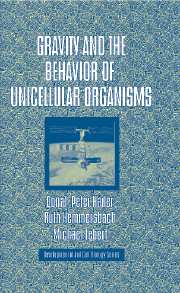Book contents
- Frontmatter
- Contents
- List of Abbreviations
- Preface
- 1 Introduction
- 2 Methods in Gravitational Biology
- 3 Image Analysis
- 4 Ciliates
- 5 Flagellates
- 6 Other Organisms
- 7 Responses to Other Stimuli
- 8 Energetics
- 9 Models for Graviperception
- 10 Evolutionary Aspects of Gravisensing: From Bacteria to Men
- 11 Perspectives
- References
- Index
6 - Other Organisms
Published online by Cambridge University Press: 18 August 2009
- Frontmatter
- Contents
- List of Abbreviations
- Preface
- 1 Introduction
- 2 Methods in Gravitational Biology
- 3 Image Analysis
- 4 Ciliates
- 5 Flagellates
- 6 Other Organisms
- 7 Responses to Other Stimuli
- 8 Energetics
- 9 Models for Graviperception
- 10 Evolutionary Aspects of Gravisensing: From Bacteria to Men
- 11 Perspectives
- References
- Index
Summary
This chapter summarizes our knowledge from gravitational biological experiments performed with “other” organisms, which means other than ciliates and flagellates. Amoeba, cellular and acellular slime molds, swimming reproductive stages — such as zoospores and sperm cells — and bacteria have been exposed to altered gravitational stimulation to analyze the impact on behavior and, in few cases, on biochemical processes. In all examples given, a clear hypothesis on the mechanism of graviperception is still missing and should be a task for the future.
Amoeba
Amoeboid cells are characterized by their actin- and myosin-driven (amoeboid) movement along surfaces (for a review, see Hausmann & Hülsmann, 1996). A weak tendency for negative gravitaxis in Amoeba has been stated (Klopocka, 1983). Cultivation of Amoeba proteus at 40 × g for 36 days did not induce detectable changes in cell form or function (Montgomery et al., 1965). Cultivation of Pelomyxa carolinesis in microgravity on Biosatellite II for 2 days indicated a slightly increased division rate (Ekberg et al., 1971), whereas another experiment stated no effect on growth rate and morphology (Abel et al., 1971). The mechanism of graviperception of amoeba needs to be investigated.
Slime molds
Dictyostelium
The cellular slime mold Dictyostelium discoideum is characterized by a life cycle alternating between a multicellular pseudoplasmodium (slug) stage and a unicellular amoeboid stage.
- Type
- Chapter
- Information
- Gravity and the Behavior of Unicellular Organisms , pp. 106 - 112Publisher: Cambridge University PressPrint publication year: 2005



